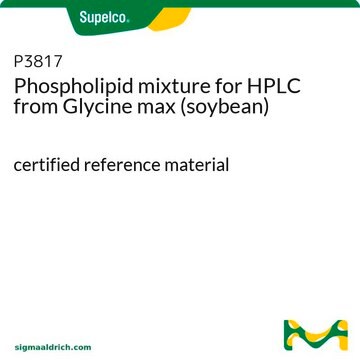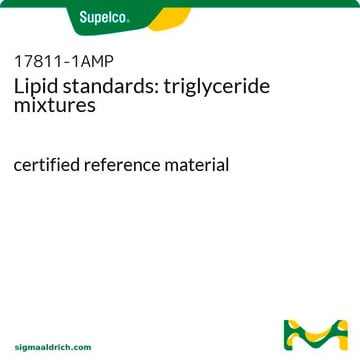11145
Soy Phospholipids
mixture of phospholipids
Sinónimos:
Soy Lecithin, Soybean Phospholipids
Iniciar sesiónpara Ver la Fijación de precios por contrato y de la organización
About This Item
UNSPSC Code:
12352204
NACRES:
NA.32
Productos recomendados
Quality Level
form
powder or granules
concentration
≥20% (phosphatidyl choline, TLC)
impurities
≤3% water
~25% phosphatidylcholine
storage temp.
2-8°C
Categorías relacionadas
General description
Asolectin comprises roughly equal proportions of lecithin, cephalin and phosphatidylinositol along with minor amounts of other phospholipids and polar lipids. Good source of fatty acids: about 24% saturated fatty acids, 14% mono-unsaturated and 62% poly-unsaturated fatty acids. For the reconstitution of vesicles in membrane studies; review about the swelling of soybean phospholipids in water and their function as oil-in-water emulsifiers.
Application
Soy Phospholipids has been used:
- to prepare liposomes to load for viscosupplementation testing
- to prepare soy lecithin (SL)-based extenders and assess its potential as a viable alternative to be used in buck sperm freezing media
- to prepare liposome for the liposome co-sedimentation assay
Biochem/physiol Actions
Soy Phospholipids are potentially used as biologically active food additives. These lipids exhibit several biochemical and physical effects that might be useful to prevent pathogenesis. Soy phospholipids are known to lower lipid levels, regulate cholesterol and triglyceride levels, stabilize membrane functions, and support hepatic functions.
Storage Class
11 - Combustible Solids
wgk_germany
WGK 3
flash_point_f
Not applicable
flash_point_c
Not applicable
ppe
Eyeshields, Gloves, type N95 (US)
Certificados de análisis (COA)
Busque Certificados de análisis (COA) introduciendo el número de lote del producto. Los números de lote se encuentran en la etiqueta del producto después de las palabras «Lot» o «Batch»
¿Ya tiene este producto?
Encuentre la documentación para los productos que ha comprado recientemente en la Biblioteca de documentos.
Los clientes también vieron
Tu Anh Nguyen et al.
Current biology : CB, 31(2), 271-282 (2020-11-14)
Multicellular organisms employ fluid transport networks to overcome the limit of diffusion and promote essential long-distance transport. Connectivity and pressurization render these networks especially vulnerable to wounding. To mitigate this risk, animals, plants, and multicellular fungi independently evolved elaborate clotting
Abigail Tabarez et al.
Animal reproduction science, 217, 106473-106473 (2020-05-16)
The aim of this study was to address whether soy lecithin (SL) was an effective non-penetrating cryoprotectant for buck sperm cryopreservation in the presence of seminal plasma. There was also an attempt to determine the optimal concentration of BHT as
Dominika Kozon et al.
Chembiochem : a European journal of chemical biology, 22(6), 1020-1029 (2020-10-31)
Amphiphilic antimicrobial polymers display activity against the outer bacterial cell membrane, triggering various physiological effects. We investigated the regulation of ion transport across the lipid bilayer to understand differences in biological activity for a series of amphiphilic polymethyloxazoline - polyethyleneimine
Insights on the Quest for the Structure-Function Relationship of the Mitochondrial Pyruvate Carrier.
José Edwin Neciosup Quesñay et al.
Biology, 9(11) (2020-11-25)
The molecular identity of the mitochondrial pyruvate carrier (MPC) was presented in 2012, forty years after the active transport of cytosolic pyruvate into the mitochondrial matrix was first demonstrated. An impressive amount of in vivo and in vitro studies has
Risheng Wei et al.
Cell research, 26(9), 977-994 (2016-08-31)
Ryanodine receptors (RyRs) are a class of giant ion channels with molecular mass over 2.2 mega-Daltons. These channels mediate calcium signaling in a variety of cells. Since more than 80% of the RyR protein is folded into the cytoplasmic assembly
Nuestro equipo de científicos tiene experiencia en todas las áreas de investigación: Ciencias de la vida, Ciencia de los materiales, Síntesis química, Cromatografía, Analítica y muchas otras.
Póngase en contacto con el Servicio técnico






